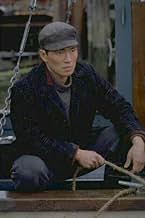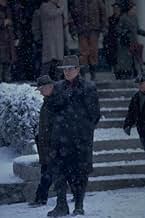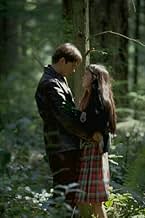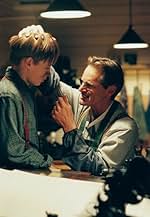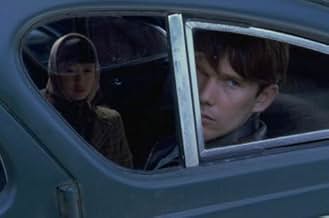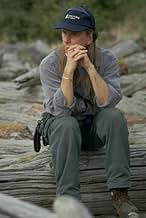VALUTAZIONE IMDb
6,7/10
14.848
LA TUA VALUTAZIONE
Un pescatore Giapponese-Americano è accusato di aver ucciso il suo vicino in mare.Un pescatore Giapponese-Americano è accusato di aver ucciso il suo vicino in mare.Un pescatore Giapponese-Americano è accusato di aver ucciso il suo vicino in mare.
- Candidato a 1 Oscar
- 5 vittorie e 11 candidature totali
Max von Sydow
- Nels Gudmundsson
- (as Max Von Sydow)
Yûki Kudô
- Hatsue Miyamoto
- (as Youki Kudoh)
Daniel von Bargen
- Carl Heine Sr.
- (as Daniel Von Bargen)
Recensioni in evidenza
10jhclues
Honor and justice, the effects of prejudice, and most importantly the need for truth; all elements that bind us together as a community of Man, or threaten to tear us apart, depending upon the circumstances at hand, and how we, as a society approach them. What it all comes down to is having and living by a moral code, and applying that code objectively, especially in troubled times. And the real question is, when the time comes, are we as a people capable of achieving that objectivity that is imperative in assuring true justice for all? It's an important, legitimate question posed by director Scott Hicks in `Snow Falling On Cedars,' a very real and personal drama, that in the final analysis has a bearing of monumental proportions that ultimately defines who we are and what we are made of, while ascertaining whether or not we do, indeed, have the moral courage necessary to survive as a civilized species.
It's a small town in the State of Washington; the ninth anniversary of the attack on Pearl Harbor is coming up, and a young man named Kazuo Miyamoto (Rick Yune), a much decorated American soldier during the war, is on trial for the murder of local fisherman Carl Heine (Eric Thal). Covering the trial is reporter Ishmael Chambers (Ethan Hawke), whose father, Arthur (Sam Shepard), had been a respected newspaperman locally for many years, known as a man who was not afraid to speak from his conscience when writing an editorial, and who took a stand for the Japanese locals during the emotionally exasperating years encompassing World War II.
Attempting to objectively cover Kazuo's trial, Ishmael finds himself troubled by a conflict of interests; he has a history with Kazuo's wife, Hatsue (Youki Kudoh), a former relationship reaching back to their childhood, but which ended with the onset of the war. And Ishmael still is grappling with the bitterness he has felt since that time, born of his experiences in the military, as well as Hatsue's rejection of him. And now he is forced to objectively observe this pivotal point in her life, watching from the sidelines and seeing first hand the effects of the prejudice that is very much alive among the local citizenry, and which threatens the assurance of an impartial judgment in Kazuo's case; a judgment that will determine the future of not only Kazuo, but of Hatsue, the woman Ishmael once loved-- and still does.
Working from an intelligent screenplay (by Hicks and Ronald Bass, adapted from the novel by David Guterson), with this film Hicks demonstrates the difference between a visionary filmmaker and someone who just makes movies. In another's hands, because of the story itself, this would have no doubt been an excellent film; with Hicks directing, however, it becomes something much more, as he has taken it beyond excellent, crafting and delivering a film that is thoroughly mesmerizing, majestic and memorable. It's an accomplishment achieved through a visionary presentation, born of the director's sensitive approach to the material and his acute insights into the human condition. Fully utilizing all of the magic at his disposal, Hicks has taken a good film and turned it into an emotionally involving, inspirational and visually poetic experience.
With a haunting score by James Newton Howard underscoring the magnificent cinematography of Robert Richardson, Hicks brings the era and the rural splendor of Washington State vividly to life, creating an aesthetic ambiance that makes the emotional essence of the drama almost tangible; and by exacting some incredible performances from his actors, he sustains that emotional level and combines all of these elements to make this film riveting and unforgettable.
As Ishmael, Ethan Hawke gives a reserved, understated performance, through which he genuinely captures the essence of his character. Watching him, you can sense the turmoil of a soul at cross purposes with itself, and he enables you to sample that taste of bitterness toward life he so desperately needs to overcome if he is to move on within himself to greener pastures. With this role, Hawke was given the opportunity to do something fine, and he succeeds with one of his most memorable performances yet.
Youki Kudoh turns in an extremely affecting performance, as well, as Hatsue. With this moving portrayal of a young woman enduring unbearable inner turmoil, she fulfills the artistic promises made in previous films, such as `Mystery Train' in '89, and `Picture Bride,' in 1965. She's a terrific actor, whose eyes are truly a window to her soul.
Also adding to the success of this film are the supporting efforts of Richard Jenkins, as Sheriff Moran, and James Rebhorn as prosecutor Alvin Hooks. But the most notable performance of all comes from Max von Sydow, who as Kazuo's defense attorney, Nels Gudmundsson, is given an opportunity to return to the kind of role that shaped his career early on under the auspices of Ingmar Bergman. As Nels, von Sydow gives a performance made all the more powerful by the restraint and subtlety of his delivery. He takes what to most actors would be a good part, and makes it a cohesive element of the film. It's a performance that by all rights should have earned von Sydow an Oscar nomination, but sadly did not.
The supporting cast includes Reeve Carney (Young Ishmael), Ann Suzuki (Young Hatsue), James Cromwell (Judge Fielding), Ariia Bareikis (Susan Marie), Celia Weston (Etta) and Daniel von Bargen (Carl). In a year (1999) that saw lesser efforts acknowledged, `Snow Falling On Cedars' was inexplicably ignored at Oscar time (except for Richardson's most deserving nomination for cinematography); an injustice, to say the least, as this was clearly one of the best films of the year. Reminiscent of Ang Lee's artistry, yet with a style uniquely his own, Hicks has given us a poetic film of rare beauty and conscience, for which he is hereby granted an Award in it's purest form:
The gratitude of an appreciate audience. 10/10.
It's a small town in the State of Washington; the ninth anniversary of the attack on Pearl Harbor is coming up, and a young man named Kazuo Miyamoto (Rick Yune), a much decorated American soldier during the war, is on trial for the murder of local fisherman Carl Heine (Eric Thal). Covering the trial is reporter Ishmael Chambers (Ethan Hawke), whose father, Arthur (Sam Shepard), had been a respected newspaperman locally for many years, known as a man who was not afraid to speak from his conscience when writing an editorial, and who took a stand for the Japanese locals during the emotionally exasperating years encompassing World War II.
Attempting to objectively cover Kazuo's trial, Ishmael finds himself troubled by a conflict of interests; he has a history with Kazuo's wife, Hatsue (Youki Kudoh), a former relationship reaching back to their childhood, but which ended with the onset of the war. And Ishmael still is grappling with the bitterness he has felt since that time, born of his experiences in the military, as well as Hatsue's rejection of him. And now he is forced to objectively observe this pivotal point in her life, watching from the sidelines and seeing first hand the effects of the prejudice that is very much alive among the local citizenry, and which threatens the assurance of an impartial judgment in Kazuo's case; a judgment that will determine the future of not only Kazuo, but of Hatsue, the woman Ishmael once loved-- and still does.
Working from an intelligent screenplay (by Hicks and Ronald Bass, adapted from the novel by David Guterson), with this film Hicks demonstrates the difference between a visionary filmmaker and someone who just makes movies. In another's hands, because of the story itself, this would have no doubt been an excellent film; with Hicks directing, however, it becomes something much more, as he has taken it beyond excellent, crafting and delivering a film that is thoroughly mesmerizing, majestic and memorable. It's an accomplishment achieved through a visionary presentation, born of the director's sensitive approach to the material and his acute insights into the human condition. Fully utilizing all of the magic at his disposal, Hicks has taken a good film and turned it into an emotionally involving, inspirational and visually poetic experience.
With a haunting score by James Newton Howard underscoring the magnificent cinematography of Robert Richardson, Hicks brings the era and the rural splendor of Washington State vividly to life, creating an aesthetic ambiance that makes the emotional essence of the drama almost tangible; and by exacting some incredible performances from his actors, he sustains that emotional level and combines all of these elements to make this film riveting and unforgettable.
As Ishmael, Ethan Hawke gives a reserved, understated performance, through which he genuinely captures the essence of his character. Watching him, you can sense the turmoil of a soul at cross purposes with itself, and he enables you to sample that taste of bitterness toward life he so desperately needs to overcome if he is to move on within himself to greener pastures. With this role, Hawke was given the opportunity to do something fine, and he succeeds with one of his most memorable performances yet.
Youki Kudoh turns in an extremely affecting performance, as well, as Hatsue. With this moving portrayal of a young woman enduring unbearable inner turmoil, she fulfills the artistic promises made in previous films, such as `Mystery Train' in '89, and `Picture Bride,' in 1965. She's a terrific actor, whose eyes are truly a window to her soul.
Also adding to the success of this film are the supporting efforts of Richard Jenkins, as Sheriff Moran, and James Rebhorn as prosecutor Alvin Hooks. But the most notable performance of all comes from Max von Sydow, who as Kazuo's defense attorney, Nels Gudmundsson, is given an opportunity to return to the kind of role that shaped his career early on under the auspices of Ingmar Bergman. As Nels, von Sydow gives a performance made all the more powerful by the restraint and subtlety of his delivery. He takes what to most actors would be a good part, and makes it a cohesive element of the film. It's a performance that by all rights should have earned von Sydow an Oscar nomination, but sadly did not.
The supporting cast includes Reeve Carney (Young Ishmael), Ann Suzuki (Young Hatsue), James Cromwell (Judge Fielding), Ariia Bareikis (Susan Marie), Celia Weston (Etta) and Daniel von Bargen (Carl). In a year (1999) that saw lesser efforts acknowledged, `Snow Falling On Cedars' was inexplicably ignored at Oscar time (except for Richardson's most deserving nomination for cinematography); an injustice, to say the least, as this was clearly one of the best films of the year. Reminiscent of Ang Lee's artistry, yet with a style uniquely his own, Hicks has given us a poetic film of rare beauty and conscience, for which he is hereby granted an Award in it's purest form:
The gratitude of an appreciate audience. 10/10.
Adapting this novel with its tricky, time-shifting narrative was always going to be a big task, but Scott Hicks' sumptuous and elegant film very nearly pulls it off. Hicks and co-writer Ron Bass move quickly into the courtroom and wisely use the trial to drive the plot, telling the backstory - the real story in this case - through a finely-woven complex of flashbacks. The difficulty is that this story is a rich, long and emotional tale which requires a fair degree of exposition for it to be satisfying. The screenplay is superbly economical in this regard, but there is no escaping the fact that the only way to cover so much ground in a film of tolerable length is to fly over it at 30,000 feet. The necessarily distant treatment this requires occasionally dilutes the emotional force which would have come from a more thorough and leisurely telling. Hicks strives valiantly to compensate with a powerfully emotive score - this works, but it doesn't always hit the mark. Rather than engendering emotion, James Newton Howard's musical is often so insistently overpowering that it locks the audience out. On occasions I felt strangely alienated by a wall of sound when I knew I should have been in tears. But that's a minor flaw in an otherwise excellent production. Overall, this is an intelligent and considered adaptation - probably the best that could be made from a novel which would have been incredibly difficult to bring to the screen. It's solidly acted, immaculately lit, and offers some of the most achingly beautiful imagery to illuminate the screen in years (the opening shots are magnificent). Most rewarding of all is the fact that Scott Hicks takes some real stylistic risks with this film. They don't always pay off, but when they do it's magical.
Snow Falling on Cedars
Nominated for best cinematography, this film deserved to give American Beauty a better run for its money. Sadly savaged by many critics, who seemed to fail to grasp the depth of the story and the beauty with which it was told because they were too busy analyzing the parts. Snow Falling on Cedars follows a mixed race love that is complicated by the onset of war. The reactions of the two principle characters betrays not only how human love can transcend itself into something greater but how those involved can find fulfillment in themselves through its sacrifice. The exquisite symbolism (you could write a book on the different things snow could symbolize after watching this) is never overplayed - in other words, the viewer can enjoy the film as entertainment without having "deeper meanings" rammed down their throat - but they are there in abundance, from the way the scenery is developed to small details such as the main character's name ("Ishmael" - meaning "He whom God hears").
Nominated for best cinematography, this film deserved to give American Beauty a better run for its money. Sadly savaged by many critics, who seemed to fail to grasp the depth of the story and the beauty with which it was told because they were too busy analyzing the parts. Snow Falling on Cedars follows a mixed race love that is complicated by the onset of war. The reactions of the two principle characters betrays not only how human love can transcend itself into something greater but how those involved can find fulfillment in themselves through its sacrifice. The exquisite symbolism (you could write a book on the different things snow could symbolize after watching this) is never overplayed - in other words, the viewer can enjoy the film as entertainment without having "deeper meanings" rammed down their throat - but they are there in abundance, from the way the scenery is developed to small details such as the main character's name ("Ishmael" - meaning "He whom God hears").
This movie is based on the book of the same name by author David Guterson. It is *highly* recommended to read the book before watching this movie as, in the opinion of this reviewer, the movie is an unintelligible mess that leaves out vitally important material to the understanding of the plot.
While it is not always possible to retain the feeling and spirit of a work of fiction through the screenplay writing process, I believe that this is one case in which the screen writers failed to capture the essence of the characters and what the author was trying to impart, despite the fact that Mr. Guterson was involved in the process.
Even though the movie departs from book in several vital area's that drastically change the symbology and moral of the story, the cinematography in this movie is splendid; it captures a feeling of 1950's Americana in very convincing fashion and by itself, this imagery brings much of the feeling of time home to the viewer in a real and emotionally dramatic sense.
It is really too bad that more was not done to preserve the beautiful symbology of the book and, though it must be a difficult task, that the essence of the characters was not more carefully interpretted in a true-to-the-book fashion. The director comments that he was not attempting a very literal translation, and in this I think he makes a rather grave mistake and ends up doing both the movie and the story a disservice.
Again, I highly recommend reading the book before watching this movie, even though it might take away from your appreciation of the cinematography as you struggle to reconcile the directors choices with the authors obvious intended meaning.
While it is not always possible to retain the feeling and spirit of a work of fiction through the screenplay writing process, I believe that this is one case in which the screen writers failed to capture the essence of the characters and what the author was trying to impart, despite the fact that Mr. Guterson was involved in the process.
Even though the movie departs from book in several vital area's that drastically change the symbology and moral of the story, the cinematography in this movie is splendid; it captures a feeling of 1950's Americana in very convincing fashion and by itself, this imagery brings much of the feeling of time home to the viewer in a real and emotionally dramatic sense.
It is really too bad that more was not done to preserve the beautiful symbology of the book and, though it must be a difficult task, that the essence of the characters was not more carefully interpretted in a true-to-the-book fashion. The director comments that he was not attempting a very literal translation, and in this I think he makes a rather grave mistake and ends up doing both the movie and the story a disservice.
Again, I highly recommend reading the book before watching this movie, even though it might take away from your appreciation of the cinematography as you struggle to reconcile the directors choices with the authors obvious intended meaning.
This is one of those films that needs to be seen a second time to pick up on the subtleties of the plot. It is a feast for the eyes and features outstanding acting. It also has a sense of balance. It doesn't manipulate its viewer. The murder mystery isn't one that brings in forces that threaten the main character. The forces are prejudice and fear. The adversaries are not people carrying guns but rather the legal system that often overlooked the rights of people of another race or ethnic background. The internment camps are part of the backdrop. I know that people say this is slow, but so is the process these people faced.
I loved the intellectual character of the young man who has to look past his own feeling and try to bring closure to someone he will never be able to have. The transitions are so breathtaking. The winter scenes are a portrait of softness and violence. My wife had read the book upon which this is based and said that the movie might be interesting. Apparently, the producers were unwilling to go the extra mile to get this noticed. It's a gem and deserves to be on a list of very fine movies.
I loved the intellectual character of the young man who has to look past his own feeling and try to bring closure to someone he will never be able to have. The transitions are so breathtaking. The winter scenes are a portrait of softness and violence. My wife had read the book upon which this is based and said that the movie might be interesting. Apparently, the producers were unwilling to go the extra mile to get this noticed. It's a gem and deserves to be on a list of very fine movies.
Lo sapevi?
- QuizWhen the Japanese-Americans are sent to internment camps, many of the extras were Japanese-Americans who had actually been sent to the camps in the 1940s.
- BlooperJapanese guests wear black ties at the wedding. They should be wearing white ties. In Japan, black ties are for funerals.
- Citazioni
Nels Gudmundsson: It takes a rare thing, a turning point, to free oneself from any obsession. Be it prejudice or hate, or, even love.
- Curiosità sui creditiJan Rubes and Sheila Moore are on the credits despite their scenes being deleted.
- Colonne sonoreMoon over Burma
Written by Friedrich Hollaender (as Frederick Hollander), Frank Loesser
Performed by Dorothy Lamour
Courtesy of the RCA Records Label of BMG Entertainment
I più visti
Accedi per valutare e creare un elenco di titoli salvati per ottenere consigli personalizzati
- How long is Snow Falling on Cedars?Powered by Alexa
Dettagli
- Data di uscita
- Paese di origine
- Siti ufficiali
- Lingue
- Celebre anche come
- El Acusado
- Luoghi delle riprese
- Aziende produttrici
- Vedi altri crediti dell’azienda su IMDbPro
Botteghino
- Budget
- 35.000.000 USD (previsto)
- Lordo Stati Uniti e Canada
- 14.417.593 USD
- Fine settimana di apertura Stati Uniti e Canada
- 32.135 USD
- 26 dic 1999
- Lordo in tutto il mondo
- 23.049.593 USD
- Tempo di esecuzione
- 2h 7min(127 min)
- Colore
- Mix di suoni
- Proporzioni
- 2.39 : 1
Contribuisci a questa pagina
Suggerisci una modifica o aggiungi i contenuti mancanti


